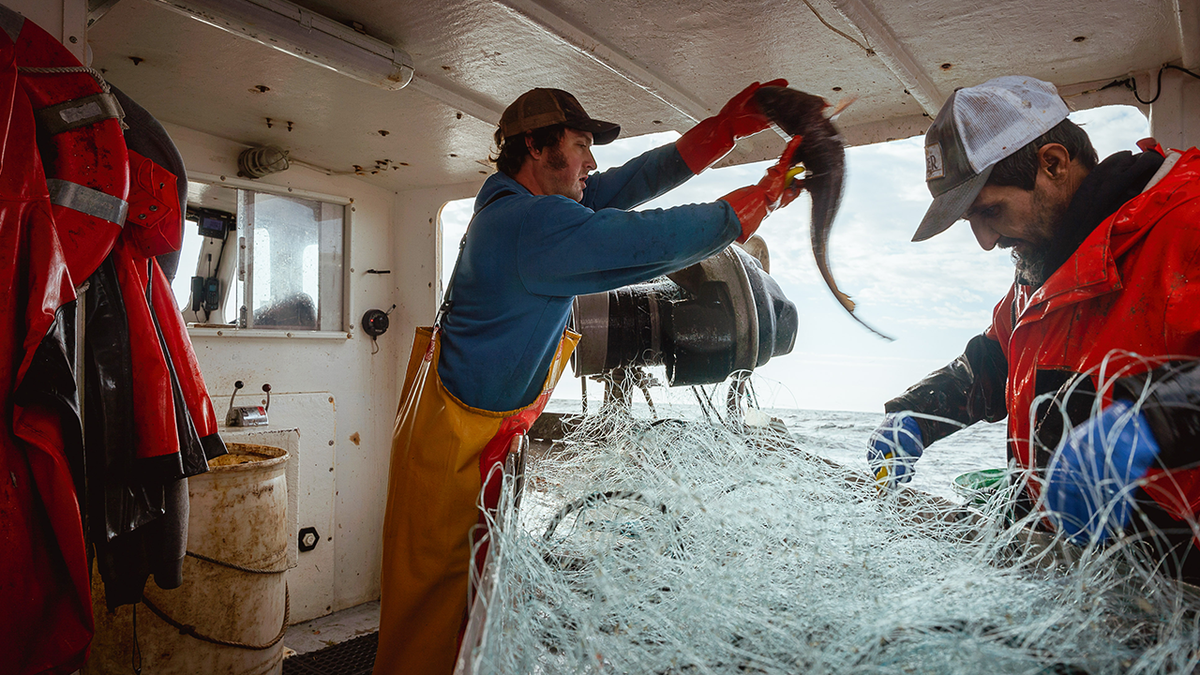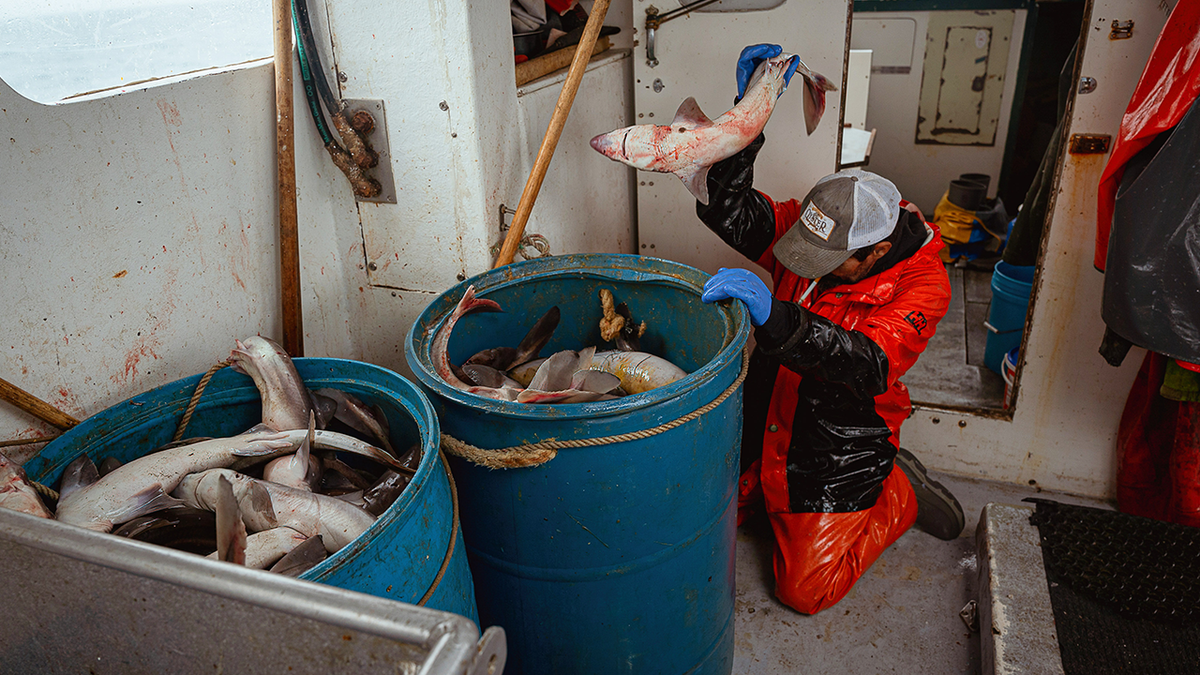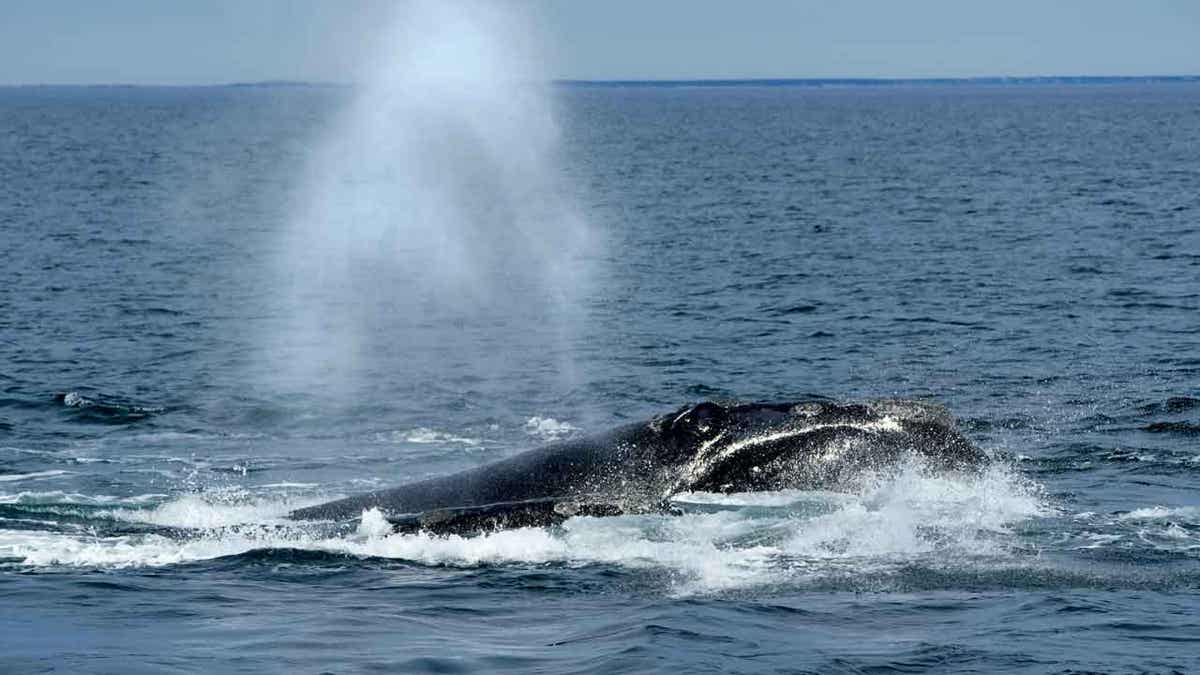Fishers says Biden administration has made job ‘more difficult’ in nearly ‘every way’
Industry leaders say new rules around offshore wind farms have destroyed wildlife and impacted their livelihood
The Biden administration has prioritized green energy at the expense of endangered whales and the U.S. fishing industry with regulation that limits both commercial fishing and recreational boating, according to experts.
The Vessel Strike Reduction Rule is a new rule proposed by the Biden administration's Commerce Department in partnership with The National Oceanic and Atmospheric Administration (NOAA) that would limit the speed of all motorboats over 35 feet from Florida to Massachusetts to 10 knots, or 11.5 miles per hour, for up to seven months of the year. The rule is marketed as a way to protect the endangered right whale, but fishing experts and anglers say the move would have far-reaching implications for their industry.
Meghan Lapp, the fisheries liaison for Seafreeze Ltd., the largest producer and trader of sea-frozen seafood on the U.S. East Coast, told Fox News Digital there are complexities behind fishing that require anglers to know where they can go and what they are allowed to do in that area.
"It's funny because we joke like you need a law degree to go fishing, but that's actually the level of regulation that us commercial fishermen are held to," Lapp said.
Bonnie Brady, executive director of the Long Island Commercial Fishing Association, told Fox News Digital that the Biden administration has made fishing more difficult in "pretty much every way they can" under the guise of climate protections, such as the expansion of offshore wind energy infrastructure with marine protected areas at the expense of domestic commercial fishing.

A crew member throws a pollock fish while another sorts through the nets off the coast of Maine. ((Photo by Mailee Osten-Tan/SOPA Images/LightRocket via Getty Images))
"Regulations haven't stopped, and now we've got a multitude of other regulations," including marine protected areas, she explained. "They want to basically put offshore wind on most of the areas in federal waters where we do fish … so it's a real problem for us."
"Instead of allowing the domestic industry to grow, offshore wind, which I'll just say that's the biggest threat to commercial fishing in the United States that exists today, and it is being pumped up and pushed out on steroids by this administration in the ready, shoot, aim policy that is not only not taking commercial fishermen into account, but the ocean itself and all the denizens of it," Brady added.
Gabriella Hoffman, a senior fellow at the Independent Women's Forum's (IWF) Center for Energy and Conservation, explained that professional anglers and recreational boaters are the latest target of the Biden administration after its efforts against Maine lobstermen failed in recent months.
In May, the Maine Lobstermen's Association (MLA) won in federal court after it sued the Biden administration's National Marine Fisheries Service (NMFS) over its rule that the government said was aimed at protecting the endangered North Atlantic right whale, but the lobstermen argued it would simply put family-owned lobster fisheries out of business.
The new federal rules targeted at recreational fishing and boating in the Atlantic Ocean will have implications on economic and public waters, Hoffman explained.
"The worst fear that a lot of recreational boaters and fishers have communicated to me is that it will infringe on their ability to access fishing opportunities on public waters, and so they see this rule as being very unreasonable," she said. "They weren't consulted and they worry that it potentially will put their industries at risk and also jeopardize public waters access."
The North Atlantic Right Whales are falling in population, and it is estimated there are fewer than 350 left. The species are threatened by vessel strikes and entanglement in fishing gear, but fishermen said there are other concerns, such as conservation, that are also important to their industry.

A crew member aboard a commercial fishing boat throws a dogfish into a blue bucket, caught off the coast of Maine as a bycatch. ((Photo by Mailee Osten-Tan/SOPA Images/LightRocket via Getty Images))
"They worry that conservation funding will be depleted as a result if their industry is stalled, if there's this moratorium to go offshore for upwards of six months of the year," she said.
LEFT-WIN GOVERNOR'S RITZY FUNDRAISER SHUT DOWN BY CLIMATE PROTESTORS
As they are imposing more regulations, they are also promoting offshore wind, which is actually harming commercial and recreational boating and potentially killing whales, Brady and Lapp said.
"They positioned us as being these evildoers and now, 20 years later, whales are dropping dead like pigeons in Manhattan," Brady said. "Here commercial fishermen and coastal communities are at the front line of fighting to protect the ocean itself, and we have crickets from virtually every NGO."
Lapp said the fishing industry is the most impacted by offshore wind because it means the loss of thousands of square miles of fishing grounds, exclusion zones, navigational safety problems and even regulations that she said could lead to loss of life at sea.

A North Atlantic right whale surfaces on Cape Cod Bay in Massachusetts, Monday, March 27, 2023. The protected species has been at the center of a longtime dispute between federal regulators and commercial fishing and shipping industries. (AP Photo/Robert F. Bukaty, NOAA permit # 21371)
"It's that intense and nobody cares because the government is just going to do what the wind developers are told to do," she explained. "These offshore wind developers, many of them are owned by foreign governments, so it's foreign governments sometimes that are telling the Biden administration what it's going to do, to the detriment of U.S. fishermen."
The rapid expansion of offshore wind, whatever the consequence, has been the greatest threat to commercial fishing, particularly on the East coast of the United States, Lapp said.
"If everything goes in that they want to go in, you'll be buying all your seafood from China in 20 years, I can tell you that, because we cannot operate in a wind farm," she said. "Offshore wind has the potential to completely annihilate essentially."
CLICK HERE TO GET THE FOX NEWS APP
For more Culture, Media, Education, Opinion, and channel coverage, visit foxnews.com/media

